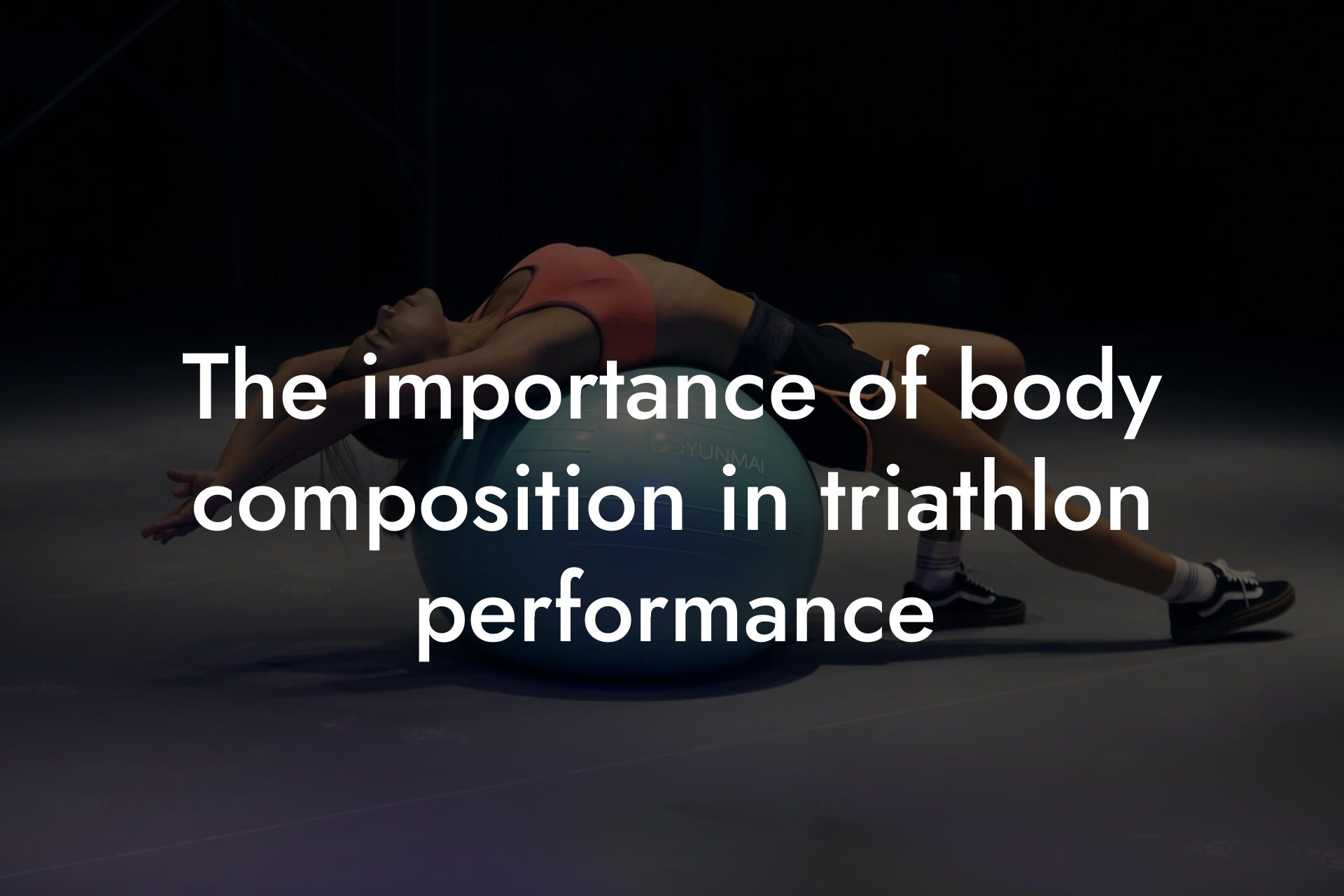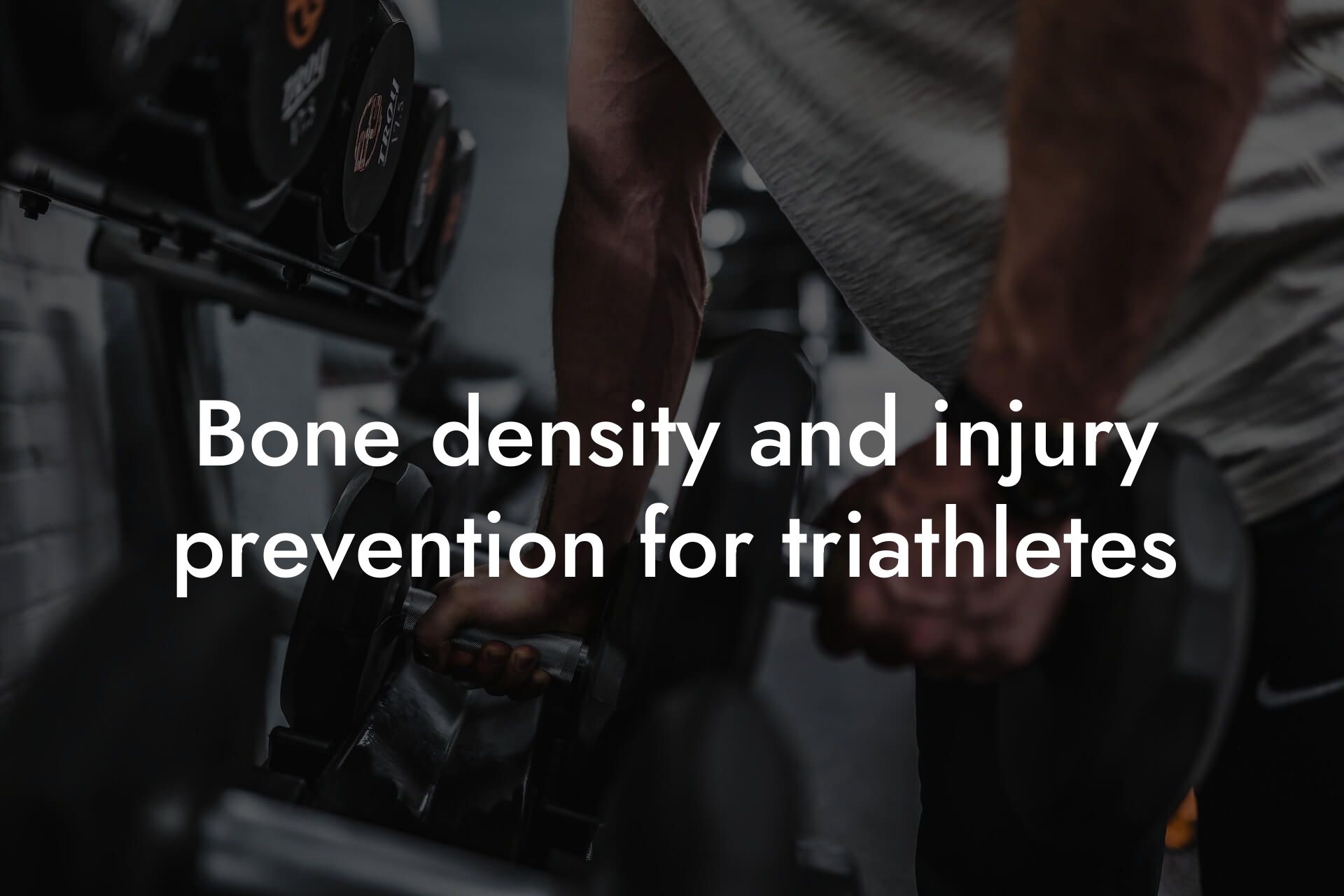As a triathlete, the off-season can be a daunting time. You've worked hard to achieve your goals, and now it's time to take a break and recharge. But, it's essential to remember that the off-season is not just a time to relax, it's also an opportunity to improve your weaknesses, work on your overall fitness, and set yourself up for success in the upcoming season. In this article, we'll explore the best off-season training strategies for triathletes, helping you to maintain your physical performance, improve your body composition, and come back stronger than ever.
Table of Contents
Set Your Goals
Before you start your off-season training, it's crucial to set clear goals for yourself. What do you want to achieve in the upcoming season? Do you want to improve your overall performance, increase your endurance, or focus on a specific discipline? Setting specific, measurable, and achievable goals will help you stay motivated and focused throughout the off-season. Take the time to reflect on your past performances, identify areas for improvement, and create a plan to tackle them.
Periodization: The Key to Success
Periodization is a training concept that involves dividing your training into specific periods or phases, each with a specific focus. In the off-season, it's essential to periodize your training to ensure you're not overtraining or undertraining. A typical off-season periodization plan would include:
- A transition phase: 2-4 weeks of active recovery, focusing on low-intensity exercise and flexibility work.
- A strength phase: 8-12 weeks of strength training, focusing on building power and endurance.
- A base phase: 8-12 weeks of endurance training, focusing on building your aerobic capacity.
- A build phase: 8-12 weeks of high-intensity training, focusing on simulating race conditions.
Strength Training: The Foundation of Success
Strength training is a crucial component of any off-season training plan. It helps to improve your power, endurance, and overall efficiency, making you a stronger and more resilient athlete. Focus on exercises that target your core, glutes, and legs, such as squats, lunges, and deadlifts. Aim to do 2-3 strength sessions per week, with at least one day of rest in between.
Endurance Training: Building Your Aerobic Capacity
Endurance training is essential for building your aerobic capacity, which is critical for success in triathlons. Focus on low-intensity, long-duration exercise, such as cycling, running, or swimming. Aim to do 2-3 endurance sessions per week, with at least one day of rest in between. Incorporate interval training and hill repeats to add variety and challenge to your workouts.
Incorporating Cross-Training
Cross-training is an excellent way to add variety to your off-season training, reduce the risk of injury, and improve your overall fitness. Focus on exercises that target different muscle groups, such as rowing, kayaking, or skiing. Aim to do 1-2 cross-training sessions per week, and make sure to listen to your body and take rest days as needed.
Nutrition and Recovery: The Key to Progress
Nutrition and recovery are critical components of any off-season training plan. Focus on fueling your body with a balanced diet, rich in protein, complex carbohydrates, and healthy fats. Aim to eat 5-6 meals per day, and make sure to stay hydrated by drinking plenty of water. Incorporate recovery techniques, such as foam rolling, stretching, and massage, to help your body repair and adapt to the demands of training.
Body Composition: Monitoring Your Progress
Monitoring your body composition is essential for tracking your progress and making adjustments to your training and nutrition plan. At Tano Performance Group, we use DEXA scans to provide our clients with a comprehensive body assessment, including body fat percentage, lean mass, and bone density. This information helps our clients to make informed decisions about their training and nutrition, and ensures they're on track to achieving their goals.
The off-season is a critical time for triathletes, providing an opportunity to improve weaknesses, work on overall fitness, and set yourself up for success in the upcoming season. By setting clear goals, periodizing your training, incorporating strength and endurance training, cross-training, and focusing on nutrition and recovery, you'll be well on your way to achieving your goals. Remember to monitor your progress, make adjustments as needed, and stay committed to your training plan. With the right approach, you'll come back stronger, faster, and more resilient than ever, ready to take on the challenges of the upcoming season.
Frequently Asked Questions
What is the importance of off-season training for triathletes?
Off-season training is crucial for triathletes as it allows them to recover from the physical and mental demands of the racing season, rebuild their endurance, and work on specific weaknesses or imbalances. This period provides an opportunity to focus on strength training, technique improvement, and overall fitness development, ultimately leading to improved performance in the next racing season.
How long should my off-season training last?
The duration of off-season training varies depending on individual goals, current fitness level, and the upcoming racing schedule. Generally, a 12-16 week off-season training period is recommended, allowing for a balance between recovery, rebuilding, and preparation for the next season.
What are the key components of an effective off-season training strategy?
A well-structured off-season training strategy should include a combination of strength training, endurance workouts, technique drills, and active recovery sessions. Additionally, it's essential to incorporate periodized training, goal setting, and regular assessments to monitor progress and adjust the training plan as needed.
How can I incorporate strength training into my off-season training?
Strength training is a vital component of off-season training for triathletes. Focus on exercises that target your core, legs, and glutes, such as squats, lunges, and deadlifts. Aim to perform strength training sessions 2-3 times a week, with 2-3 sets of 8-12 repetitions per exercise. Make sure to also include exercises that target your upper body, such as push-ups and rows.
What is periodized training, and how can it benefit my off-season training?
Periodized training involves dividing your training into specific blocks or phases, each with a unique focus and intensity. This approach allows for a structured and progressive increase in training load, ensuring you're adequately prepared for the demands of the upcoming racing season. Periodized training helps prevent plateaus, reduces the risk of overtraining, and promotes consistent progress.
How can I balance my off-season training with other responsibilities, such as work and family?
As a high-earning professional, it's essential to prioritize your time and energy. Create a schedule that allows for dedicated training sessions, while also accommodating your work and family commitments. Be flexible, and don't be afraid to adjust your training plan as needed. Remember, consistency is key, so aim to train at least 3-4 times a week, with one or two rest days in between.
What are some effective endurance workouts for off-season training?
During the off-season, focus on low-to-moderate intensity endurance workouts, such as steady-state rides, runs, or swims. These sessions help improve your aerobic endurance, increase your lactate threshold, and build your overall fitness. Aim to perform endurance workouts 2-3 times a week, with sessions lasting 60-120 minutes.
How can I improve my swimming technique during the off-season?
Focus on drills that target your body position, arm stroke, and kick technique. Incorporate exercises like the catch-up drill, fingertip drill, and kick sets to improve your overall efficiency in the water. Additionally, work on building your strength and endurance with strength training exercises like push-ups, pull-ups, and rows.
What are some effective ways to incorporate active recovery into my off-season training?
Active recovery sessions, such as easy spinning, yoga, or light swimming, help promote blood flow, reduce muscle soreness, and aid in the removal of waste products. Incorporate active recovery sessions 1-2 times a week, or as needed, to help your body recover from intense training sessions.
How can I monitor my progress and adjust my off-season training plan?
Regularly track your workouts, including distance, intensity, and heart rate data. Use this information to adjust your training plan, making sure you're progressing towards your goals. Additionally, schedule regular assessments with a coach or trainer to receive feedback and guidance on your training.
What are some common mistakes triathletes make during the off-season?
Common mistakes include not allowing for adequate recovery time, failing to incorporate strength training, and neglecting to periodize their training. Additionally, some triathletes may focus too much on high-intensity training, leading to burnout and decreased performance.
How can I stay motivated during the off-season?
Set specific, measurable, and achievable goals for the off-season, and break them down into smaller, manageable tasks. Celebrate your progress, no matter how small, and remind yourself of your why – the reasons you started training for triathlons in the first place. Surround yourself with like-minded individuals, and consider working with a coach or training group to stay motivated and accountable.
What is the role of nutrition in off-season training?
Nutrition plays a critical role in off-season training, as it helps support your energy needs, aids in recovery, and promotes overall health. Focus on consuming a balanced diet that includes plenty of complex carbohydrates, lean protein, and healthy fats. Pay attention to your macronutrient intake, and make adjustments as needed to support your training goals.
How can I incorporate cross-training into my off-season training?
Cross-training, such as cycling, running, or swimming, can help improve your overall fitness, reduce the risk of overuse injuries, and increase your mental freshness. Incorporate cross-training sessions 1-2 times a week, focusing on low-to-moderate intensity exercises that target different muscle groups.
What are some effective ways to manage stress and fatigue during the off-season?
Prioritize sleep, aiming for 7-9 hours of restful sleep per night. Engage in stress-reducing activities, such as yoga, meditation, or deep breathing exercises. Make time for relaxation and recovery, and avoid overcommitting yourself with too many social or work-related obligations.
How can I stay accountable and motivated during the off-season?
Work with a coach or training group to stay accountable and motivated. Share your goals and progress with friends or family members, and consider joining a triathlon community or online forum to connect with like-minded individuals. Regularly track your progress, and celebrate your successes along the way.
What are some common injuries that triathletes experience during the off-season?
Common injuries during the off-season include overuse injuries, such as tendonitis, stress fractures, and IT band syndrome. Additionally, triathletes may experience muscle imbalances, poor posture, and decreased flexibility. Focus on incorporating strength training, stretching, and active recovery sessions to reduce the risk of injury.
How can I balance my off-season training with other fitness goals, such as weight loss or body composition changes?
Focus on making sustainable lifestyle changes, such as adjusting your diet and incorporating strength training exercises. Aim to lose 0.5-1 kg per week for a sustainable weight loss, and prioritize body composition changes over weight loss. Make sure to track your progress, and adjust your training and nutrition plan as needed.
What are some effective ways to incorporate mental training into my off-season training?
Incorporate visualization exercises, positive self-talk, and mindfulness practices into your daily routine. Focus on building your confidence, resilience, and mental toughness, and practice techniques such as goal setting, self-reflection, and journaling.
How can I make the most of my off-season training?
Stay focused, motivated, and committed to your goals. Prioritize recovery, nutrition, and strength training, and make adjustments to your training plan as needed. Surround yourself with like-minded individuals, and stay accountable to your goals. Remember, the off-season is a time for growth, improvement, and preparation for the next racing season.
Here are some related articles you might love...
- The importance of body composition in triathlon performance
- Using DEXA scans to monitor triathlete health
- Bone density and injury prevention for triathletes
- Recovery techniques for triathletes after races
- Balancing training for swimming, cycling, and running
- Nutrition strategies for triathlon training and competition
- Strength training for triathletes to improve overall performance
- The role of lean muscle mass in triathlon events
- Reducing body fat for better endurance in triathlons
Zak Faulkner
Zak Faulkner is a leading authority in the realm of physical health and body composition analysis, with over 15 years of experience helping professionals optimise their fitness and well-being. As one the experts behind Tano Performance Group, Zak has dedicated his career to providing in-depth, science-backed insights that empower clients to elevate their physical performance and overall health.
With extensive knowledge of DEXA technology, Zak specializes in delivering comprehensive body assessments that offer precise data on body fat, muscle mass, bone density, and overall physique. His expertise enables individuals to make informed decisions and achieve their fitness goals with accuracy and confidence. Zak’s approach is rooted in a deep understanding of human physiology, combined with a passion for helping clients unlock their full potential through personalised strategies.
Over the years, Zak has earned a reputation for his commitment to excellence, precision, and client-focused service. His guidance is trusted by top professionals who demand the best when it comes to their health. Whether advising on fitness programs, nutritional strategies, or long-term wellness plans, Zak Faulkner’s insights are a valuable resource for anyone serious about taking their health and fitness to the next level.
At Tano Performance Group, Zak continues to lead our Content Team revolutionising how professionals approach their physical health, offering unparalleled expertise that drives real results.




